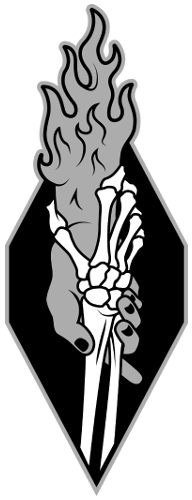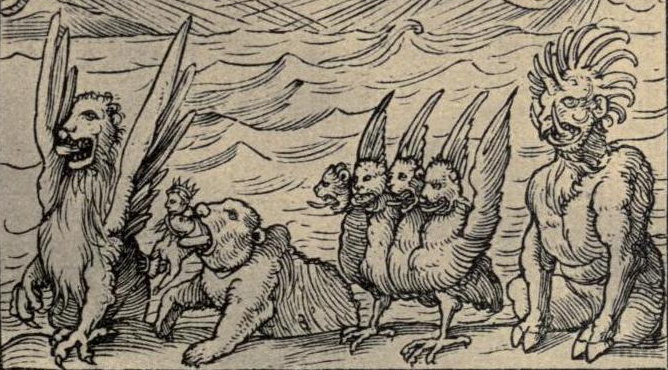The naming of Demonkind implies differentiation from other identities, practices, and paths. With any such identifying name or symbol it does not serve you to accept everything in the package without question.
For example you may admire the social welfare positions of “progressive” Catholicism, but that faith has an astoundingly brutal and rapacious history as well, and the one aspect does not cancel out the other. Many associate Buddhism with an image of non-violence and generally benign character, but recently a sexual-abuse scandal tore apart a large and successful American Buddhist organization, and in Burma mobs of Buddhists have gone on murderous rampages against members of other faiths. Satanists proclaim themselves opposed to social tyranny, but a lot of them have no problem with misogyny, racism, and such, as long as they don’t feel any negative effects themselves.
That apparent contradiction between values and deeds may be unavoidable considering humanity’s long history of self-serving violence. Just look at the glaring discrepancy between the teachings of Jesus –explicitly about feeding the poor, treating the infirm, and overturning capitalism– and the exactly opposite behavior of people that claim to worship him, like a Bizarro World religion. If Demonkind becomes widely known, over time, we can expect that someone claiming our name will inevitably act out in some way totally opposed to our stated values.
Sometimes those reversals come from the top. Practically every week we hear about a bishop or senator who molested children, or who covered up those stories to protect the molesters. Occult group leadership too often includes white supremacists and antisemites. We take it for granted that nearly all cult leaders coerce sex and money from their followers, and that the supporting officers of the cult do whatever they can to protect the leader and gaslight the victims. But again, this does not belong only to “cults”, it happens in nearly all religious, political, and philosophical associations, anywhere a seeker -like you- may look for belonging and meaning. A powerful predator, or a culture of deceit and disempowerment, or a disappointing failure to abide by the supposed values of the group, awaits you.
Choosing Forked Paths
In many cases the problem is that the paths have such a wide embrace, or such abstract terms, that they do not prevent wildly different interpretations, leaving endless room for abuse. For example “paganism” includes a stupendously broad range of roots, and modern branches, with no easy way to clarify what you mean by the term. Even if you get into specific paths, such as Asatru or Vodun, they encompass a widely divergent range of teachings and personal or regional histories. And of course bad actors lurk in them all.
You may also discover that the path you chose has elements that you wouldn’t normally approve of, in any other context, but that you’ll let slide because of your attachment to how it makes you feel to belong to that community. We typically come from difficult or traumatic backgrounds, so when we find a group that wants us, that treats us as members of a big family, that feeling pushes a LOT of emotional buttons and it overrides the critical thinking that might have protected us otherwise.
We observe this any time a prominent figure gets called out for bad behavior, and their devotees say “but think about all the GOOD they’ve done” or “I love their music so much, haters gonna hate” or “they always treated ME well”, so the devotee doesn’t have to take those accusations seriously. Maybe you noticed that the meditation guru gets a bit handsy with his acolytes, but he’s sharing his holiness with you, so you don’t complain. Maybe you heard that your group has a history of association with racists, but everyone seems really nice, so you chalk it up to gossip or bygone days.
So: none of the paths rule out harmful misinterpretations; anyone in the family, including the holy leader, could end up abusing your trust; and people want so badly to belong that they will allow their in-group to continue doing harm. Does that mean you should reject all organizations, and all identifying labels, quit them or never join? Well…
Hold Them Accountable
Firstly of course you need to protect yourself. Belonging to a family does not mean accepting abuse from them. Even “real” blood family, your parents and siblings, do not have some inbuilt right to treat you badly. You may feel obligated to them in many ways, but you do not owe them your own pain or silence! Obviously this holds especially true for “chosen” family such as a spiritual or magical group identity. You can take steps to get the best out of having such a family without having to lie, suffer, or allow others to suffer.
In cases of domestic abuse the best advice is to leave. Abusers will always continue to repeat their destructive behavior, no matter how much they apologize, no matter how much they say they love you, no matter how much they say they’ve changed. They may even behave tenderly and respectfully for a little while, but they will revert to abuse soon enough. Do not pretend otherwise. To be safe, assume the same thing about teachers and groups that have a history of gaslighting, ostracizing members who complain, or a code of silence. Leave and do not look back. The pain and difficulty of tearing yourself free does not come anywhere close to the tragedy of staying on such paths.
When you have gotten to a safer place, speak up if you can. This depends on the violence of the specific people you left, and your own sense of security and ability. But your silence can strengthen the confidence of the abuser, whereas speaking up can strengthen the confidence of other people in the organization that have also suffered; so alerting the public about your experience can bring many more voices together, to effect a change that you might not have felt you could achieve on your own. For concrete examples, look to the #metoo movement, or to recent documentaries exposing Scientology.
When you feel that the concerns you have don’t warrant such an extreme response, you can apply the techniques of behaviorist theory to get more satisfactory results from a problematic person or group. For example you can look for a way to encourage sympathetic members of the organization to press for greater transparency, or rules against unwanted sexual advances, without directly accusing the leader of the group, and without making all the members feel attacked or blamed. Maybe you can create an opportunity for positive publicity, in the form of a human-interest news article, about a “traditionalist” path updating its tenets and practices to reflect modern ethical standards. Gurus LOVE publicity, especially when it casts them in a good light.
Forging New Paths
Throughout the history of humanity, dissenters have broken away from established belief systems, in reaction to the flaws and toxic history of those systems. Sometimes those schisms went on to become vast establishments themselves, while others remained smaller and more personal. Of course at all scales they involved people who went on to hurt and disappoint others. But the point is that you do not have to settle for a path that demands you suffer in silence. You can either create your own path, if you feel so inspired, or you can read and explore among the currently erupting inflorescence of new micro-organizations around the world.
If you need familial support, find a path that can actually provide that support, instead of empty promises meant just to acquire more followers. If you want to be part of a movement with greater political clout, find one that allows room for internal dissent. For one current example, the DSA (Democratic Socialists of America) has their share of problems, but they do allow new caucuses to form, vote, have their own beliefs, and take their own actions. In a contrary example, TST has reacted to dissent by shutting down local chapters, restricting communication paths, and trying to silence anyone who complains.
Demonkind exists because we could not find any other identity that supported our our beliefs. It waits here for you, too, if you happen to share our values. We have attempted to mitigate the potential for the abuse of power by building Demonkind as a groundwork of philosophy rather than a physical organizing body. On the plus side this means far less chance of any sort of mistreatment. On the negative side we don’t have much to offer yet in terms of group activities or the embrace of a family. That balance may change over time; we will shape our policies in accordance with this evolution.
We emphatically welcome your input, including dissent, because we mean for Demonkind as a whole to learn, grow, and correct its errors. If a dispute should ever arise between fellow Demons, we would insist on transparency in the process of resolution, and accountability for all people involved. If anything, we identify this way precisely because we want to hold ourselves to a higher standard than other paths, a standard based on mutual appreciation rather than subservience.
Even if you choose not to call yourself a Demon; even if you feel more strongly drawn to a path that offers more familial engagement, or promises more power, or follows gods that you believe in; you can take what we have written here and bring it with you along those paths. You can hold yourself, and that identity, responsible in the manner we’ve described. Ask the questions that may nag at the back of your conscience. Speak up if you suspect anyone is taking advantage of their power. Know that you have the strength and the right to deny anyone power over you. And most of all, please remember that we ARE here for you, you can reach out to us at any time. We see -and welcome- the Demon in you.



